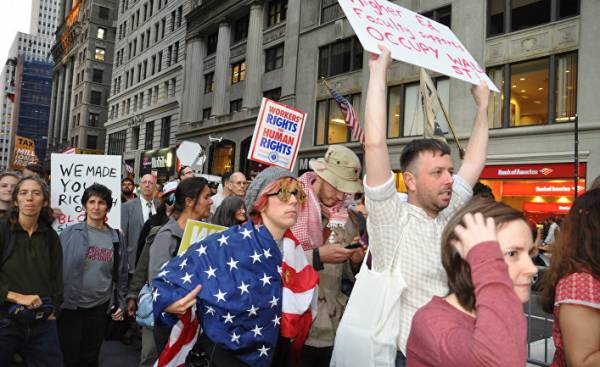
Becky Moore (Becky Moore), her husband Jeremy (Jeremy) and their four children live in a small town in southwest Ohio. From a financial point of view, their life is a life “on the edge of survival.” Describes her Becky Moore. She manages the finances of the family. Her big green purse until it stops Packed supermarkets and cheque accounts. The Moores family lives in a private, yet fully paid for house with veranda and garden. It is not a poor family — when compared to what I get on average, people in the area. Together they earn in a year 38 thousand dollars. That is, they are far from certain States the poverty line — even for a family of six people. If someone will look especially poor town in Ohio, then he will not have to come to his hometown Becky. They are residents of the suburbs, where I live is predominantly white. Her husband is a car mechanic by profession, has a permanent job and every two weeks he usually brings home the money. Becky from time to time works as a cleaning lady, she helps in the nursery for the animals, and manages the Affairs of the family. At first glance, this family leads a normal life of the middle class in the Midwest of the United States. In fact, it is not life, a constant struggle and attempts to avoid private bankruptcy.
Researchers asked Becky Moore question: how many months her family will be able to live without loans, if Jeremy’s going to lose his job? “Zero” was the response Becky. And when the couple can afford to retire? “Never,” replied Becky. Will her children ever to live better? “No.” Depends on whether your well-being from the events that you decide? “For the most part, no,” replied Becky.
On the basis of the responses received, a picture of a life without guarantees, a life in which everything is determined by someone else. Any accident, any illness can lead to financial disaster. The Moores family is representative of 40% of American households, working members of which at least have a high school diploma. According to the recently published results of a large-scale study of the Federal reserve, the American Central Bank, representatives of this group are constantly forced to fight for the stability of its financial position. The American Central Bank came to the conclusion that 44% of all households have no financial cushion to cover sudden arising financial obligations in the amount of $ 400 or more. In this case, they are forced to sell things or seek the services of a notorious small credit institutions issuing the money to pay — in America they are more than branches of McDonald’s restaurants.
American families can’t make ends meet in terms of money, because they earn too little, spend too much, or doing both. However, there is another explanation. Becky and Jeremy Moore are among 235 U.S. households with low or average income, which in the framework of a research project under the guidance of experts from the group of Jonathan Murdaca (Jonathan Morduch) and Rachel Snyder (Rachel Schneider) made it possible to thoroughly meet your financial situation. During the year, the researchers accompanied these families and recorded every dollar earned or spent by these families. They had access to data regarding their savings and loans, donations and gifts and transfers from the welfare office or other government agencies. The results of this work were presented in “Financial diaries” (Financial Diaries), which was recently published in book form. In this study, attention is paid to the same phenomenon, which is not addressed enough attention — we are talking about the fluctuations in the income of individuals. Economists, sociologists and policy in recent years, the main attention was paid to poverty and, thus, those people who have enough money to live on. In the book “Financial diaries” is presented by normal people who are constantly short of money.
The Moores family are not the first to suffer from the fact that its members have low income. She suffers from sharp fluctuations. This family depends on the salary of Jeremy, which he receives every two weeks. Jeremy works as a mechanic in a shop located near one of the Federal highways. Basically, he gets a Commission. It is credited a certain amount for each repaired car. He usually works the night shift. If you are not lucky, there will be no trucks to repair. Whereas in a good month Jeremy brings home 3400 dollars. It happens, for example, in July, when scorching heat causes overheating of engines in trucks. But a bad spring and winter months, it may happen that Jeremy will earn only half of this amount. It is in these months, Becky is faced with problems. Will she be able to pay the next mortgage installment? If the earnings Jeremy is too small, then it may have to borrow money from his sister. “I was lucky to have a sister, having a stable income,” said Becky. As a rule, the sister comes to the rescue and give first 200 dollars in a time when they did not have enough money to put gas in my minivan. Becky returns debt that cleans the house of his sister and work in her garden.
The problems that arise from the Moores are not something special in the United States. “Americans are faced with huge fluctuations in their income”, — say the experts of the Institute JP Morgan, research division of well-known investment Bank. It professionals receive hundreds of thousands of data about transactions of Bank clients, which they analyse in order to investigate the financial health of American families. Such fluctuations are becoming more significant, the researchers note. Three of four workers are people from the poorest income class (all five of them) monthly income, on average, can vary by 30%. Almost as significant are these variations in young people. Wages may be high, low — as is the case with Jeremy Moore. In this case we are not talking about the liberal professions, where such things are to be expected. Jeremy does not belong to the so-called “economy of temporary employment” (Gig-Ökonomie), characteristic of the liberal professions. Increasingly he is faced with a situation that has become normal for Americans employed at retail or working in restaurants. Held in Washington, D.C. the survey, which involved 300 employees fashion stores, supermarkets and restaurants have shown that they are losing control over their own working hours. They are divided into two categories — 25 hours of work and 38 hours, and employees are aware of their plans for the week for a few days, and sometimes the working day is divided into shifts. They don’t know what time they have to work, how long they will work and whether they have a sufficient number of working hours in order to pay the accumulated bills. However, they should always be ready.
Even the employers do not know how the situation will develop. Trading network counting use of personnel, mainly using computers, and this takes into account such factors as weather, holidays, time of day, traffic flows, and the situation with Parking spaces. However, the personal needs of employees are taken into account — a member of the Board of governors of the Federal reserve Leil Brainard (Brainard Lail) recently in his speech said that work on call makes it difficult for employees not only child care and care of older people. Complicated planning of one’s life, including further education. Brainard cited the results of a single study, 71% of people working in the retail sector, have irregular work schedule during the week.
Muram know, when Jeremy are good months. Financial advisors recommend during this period to save money. They are trying to do it and even made a savings account. “For us it is difficult. I don’t know why,” admits Becky. They can’t resist the temptation and spend the accumulated money on movie tickets or other entertainment. And bring a striking explanation — constant concern about money reduces the ability to make the right strategic decisions. Fear makes people stupid and devours his mental ability, says research Duo consisting of Sendhil of Mullainathan (Sendhil Mullainathan) and Eldar Shafir (Eldar Shafir).
Experiments with rich and poor people have confirmed this thesis. However, quite convincing was the study, which was attended by Indian farmers engaged in growing sugar cane. They receive money once a year when they sell their harvested crop. In subsequent months, they feel rich, however, a few months before the new harvest money start to end. During the rich phase the peasants in the test to determine their mental abilities demonstrate higher results than during the poor phase.
The Moores family has developed a strategy. Becky cuts from a local newspaper coupons for the purchase of goods and collects them in a special folder. Some of them she shares with a girlfriend. As soon as it is announced specials, she makes large purchases, if you have money. When the researchers went to her house, they saw that it was harvested more than a year toothbrush, razor blades, shampoo and soap. On its shelves were cans of food stored, as in a refrigerator lay deep-frozen products purchased at a bargain price. When wages Jeremy is scarce, Becky, however, can put food on the table. In one respect, successful hunt Becky for discounts inspire some confidence with the help of the tubes of toothpaste you can’t buy movie tickets. In addition, they have in service, there are two more methods of saving. Jeremy in his card payroll indicates only three, not four children. So every year in March, he receives from the Finance Department a good check as a reimbursement of overpaid amounts of tax on wages. With this check, the Moores family pays primarily accumulated from Christmas debt on credit cards.
Even more unusual method uses an employee of the casino Janice Evans (Janice Evans). It is also included in the number of households is investigated within the framework of the project “Financial diaries”. Janice keeps her savings in a Bank located at a distance of 55 kilometers from the place where she lives, while one credit institution is right next to her house. Janice cut in half your plastic card intended for withdrawal of cash. Thus, it removes money from the account only in the case when you really need them. In the period when her grandson was preparing for school, and he needed some things for school, she got cash out.
Jeremy and Becky Moore also manages to have a little bit of money on the current account. In addition, they have five credit cards, with which they have an opportunity to win a certain amount of time, and in the extreme case, there is also a sister. Somehow they manage to make financial ends meet during good and bad months. Other participants in the research project “Financial diaries” act in the same way as each other. If higher incomes, they spend on consumption more, but not very much. If in any month your income is 50% higher than the average, these households increase their spending by only 14%, and in bad months, they limit their spending. All these families to develop preventive strategies, but this is not enough.
During some weeks, they feel poor, and in others not. This reflects a realistic picture of poverty. Even the poorest families for some months manage to make ends meet. But, at least, one-third of families with average incomes not less than one month in a year be below the poverty line. Conducted between 2009 and 2011 population census showed that about 90 million Americans at least two months a year live in poverty. And the Moores family, concerns arise about the fact that they may not have enough money to buy food, and therefore Becky, reluctantly, have applied to receive food coupons. “I didn’t want that to happen at the expense of taxpayers’ money. In my opinion, many people live much worse,” she said. In 2014, the research organization Pew Charitable Trusts interviewed 7800 Americans. They were asked the question: What is more important is financial stability or a higher income? 92 percent of respondents said that stability is more important to them and it’s 11% more than in 2011.
Here is the American dream. When researchers last visited the house Murov, it turned out that Jeremy had changed the place of work. He is still in the repair trucks, but now he’s guaranteed works 40 hours and receives additional pay for overtime. If you count the year that Jeremy now receives less money. And now he takes more time to get to work. However, panky feel like they have a mountain had been lifted from his shoulders.







